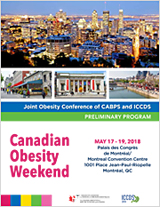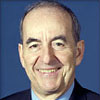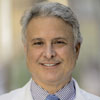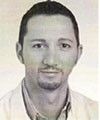
Conference Program
Friday, May 18, 2018
The CABPS Conference Program is available for downloading in the following formats:
|
Time
|
Activity
|
|
| 07:00 - 14:30 | REGISTRATION OPEN Room: 518 Foyer |
|
| 07:00 - 09:00 | BREAKFAST Room: 524ABC |
|
| 08:00 - 08:05 | Welcome & Opening Remarks Room: 520ABDE Speaker: Dr. Stephen Glazer Details
Dr. Stephen Glazer is a board certified specialist from the University of Toronto in Internal Medicine and Intensive Care Medicine. He is also a Diplomate of the American Board of Obesity Medicine. In April 2010 he was appointed as the Medical Director for the Bariatric Surgical Program at Humber River Regional Hospital. He was instrumental in redeveloping their comprehensive bariatric surgical program. In that year, the bariatric surgical program was nominated as a Leading Practice by Accreditation Canada. In 2012 Dr. Glazer was appointed as a the Director of the only hospital-based Medical Bariatric Program for the Greater Toronto Area, which has enjoyed great growth and development due to the significant contributions of its multidiscipline team members. Dr. Glazer's commitment to the Obesity Epidemic is further displayed by his participation in many committees through the Ontario Bariatric Network and the Canadian Association of Bariatric Physicians and Surgeons. He has a strong interest in program development, quality care initiatives, and physician education. He has personally been involved in direct patient care of over thousands of bariatric patients in the attempt to facilitate weight loss for improved overall health. His research interests include perioperative risk assessment and management as well as sleep apnea in the morbidly obese. |
|
| 08:05 - 08:15 | PRESIDENTIAL ADDRESS Room: 520ABDE Speaker: Dr. Laurent Biertho Details
Dr. Laurent Biertho is Clinical Professor of Surgery at Laval University. After being trained in Biomedical Sciences (1993) and Medicine (1998) at the University of Liege, Belgium, he completed his residency in General Surgery (2004). He underwent post-doctoral training in Minimally Invasive surgery at the Mount Sinai School of Medicine in New York, USA, and McMaster University, Canada (2004-2006). At the end of his training, he was appointed Assistant Professor at McMaster University. He was then offered a position as an Associate Professor of Surgery at Laval University, to introduce minimally invasive bariatric and metabolic surgery at the Institut Universitaire de Cardiologie et Pneumologie de Québec. He is the director of the fellowship program in Bariatric and Metabolic surgery at Laval University and co-director of the Research Chair in Bariatric and Metabolic Surgery. He is also the president of the Canadian Association of Bariatric Physicians and Surgeons. His research interests focus on 1) the long-term metabolic outcomes of bariatric surgeries 2) tailoring surgical approaches to the patients’ needs 3) the study and development of new bariatric procedures. He is the current President of the Canadian Association of Bariatric Physicians and Surgeons (CABPS). |
|
| Plenary Session |
08:15 - 09:30 | BARIATRICS IN THE ADOLESCENT PATIENT Room: 520ABDE Chair: Dr. Jill Hamilton Details
Jill Hamilton (MD, MSc, FRCPC) is a Pediatric Endocrinologist at the Hospital for Sick Children, Senior Associate Scientist at the Research Institute, and Professor of Paediatrics at University of Toronto. Her clinical work is in endocrinology and diabetes with a particular focus in the areas of complex obesity (including hypothalamic obesity and bariatric surgery patients). She is the medical director of the SickKids Team Obesity Management Program (STOMP) and co-chair of the Ontario Paediatric Bariatric Network (OPBN). Her research focuses on (i) the metabolic complications of obesity in childhood, (ii) biologic and psychosocial determinants of obesity, and (iii) obesity treatment. She has over 100 peer-reviewed publications and has received research funding from agencies including Canadian Institutes for Health Research (CIHR), National Institute of Health (NIH), Heart and Stroke Foundation and Canadian Diabetes Association. |
| 08:15 - 08:35 | Eating Disorders in Adolescents with Obesity Speaker: Dr. Elizabeth Dettmer Details
Dr. Elizabeth Dettmer is licensed as a clinical psychologist with a specialty in health psychology in the U.S., Canada, and Botswana. She is an Assistant Professor in the Division of Paediatrics at the University of Toronto, a Project Investigator with the SickKids Research Institute, and the Mental Health lead of the Sick Kids Team Obesity Management Program, a clinic at the Hospital for Sick Children devoted to children and adolescents with severe obesity. Dr. Dettmer’s research focuses on how psychological factors impact the development and treatment of obesity as well as psychological issues related to adolescent bariatric surgery. Dr. Dettmer is a member of the Motivational Interviewing Network of Trainers (MINT) and is experienced in providing cognitive behavioural therapy and motivational interviewing in individual, family, and group therapy contexts. Presentation Overview Learning Objectives
|
|
| 08:35 - 08:55 | Bariatric Surgery in the Adolescent Patient Speaker: Dr. Jacob Langer Details
Presentation Overview Learning Objectives
|
|
| 08:55 - 09:15 | Personalized Pediatric Obesity Management: Moving Beyond Canada's Food Guide Speaker: Dr. Jill Hamilton Details
Jill Hamilton (MD, MSc, FRCPC) is a Pediatric Endocrinologist at the Hospital for Sick Children, Senior Associate Scientist at the Research Institute, and Professor of Paediatrics at University of Toronto. Her clinical work is in endocrinology and diabetes with a particular focus in the areas of complex obesity (including hypothalamic obesity and bariatric surgery patients). She is the medical director of the SickKids Team Obesity Management Program (STOMP) and co-chair of the Ontario Paediatric Bariatric Network (OPBN). Her research focuses on (i) the metabolic complications of obesity in childhood, (ii) biologic and psychosocial determinants of obesity, and (iii) obesity treatment. She has over 100 peer-reviewed publications and has received research funding from agencies including Canadian Institutes for Health Research (CIHR), National Institute of Health (NIH), Heart and Stroke Foundation and Canadian Diabetes Association. Learning Objectives
|
|
| 09:15 - 09:30 | Panel Discussion | |
| Plenary Session |
09:30-10:30 | WEIGHT REGAIN Room: 520ABDE Co-Chairs: Drs. Judy Shiau, Louis Aronne Details

Judy Shiau, MD, FRCPC, DipABOM Dr. Shiau’s goal is to provide comprehensive care for patients who are trying to be at a healthy weight. As a general internist, her specialty initially focused on the treatment of cardiovascular disease, diabetes, cholesterol, and hypertension. She soon realized that many of these health issues were linked with weight management and this was the stimulus for her to develop the EMERALD (Evaluation of the MEtabolic syndrome for the Reduction of Atherosclerosis, Lipids, and Diabetes) weight management program at the Ottawa Cardiovascular Centre, treating over 1,000 patients from 2002 to 2012. In 2012, she joined The Ottawa Hospital Weight Management Clinic (TOH-WMC) to help support the Ontario Bariatric Network (OBN) funded medical and surgical weight management programs. However, recognizing the need for a community-based clinic to support patients, Dr. Shiau founded the LEAF Weight Management Clinic (www.leafwmc.com). LEAF stands for Live.Eat.Activity.Forever. Dr. Shiau graduated medical school from McGill University, completed general internal medicine residency training at McMaster University, and her fellowship year at the University of Toronto. She is certified as a Diplomate of the American Board in Obesity Medicine. As an Assistant Professor and Bariatric Medicine Fellowship program director at University of Ottawa, she trains future generation physicians how to better help their patients who have weight issues.
Louis J. Aronne, MD, FACP, DABOM is a leading authority on obesity and its treatment. He is the Sanford I. Weill Professor of Metabolic Research at Weill-Cornell Medical College where he directs the Comprehensive Weight Control Center, a state-of-the-art, multidisciplinary obesity research, and treatment center with one of the country’s few Obesity Medicine fellowship programs. He has an adjunct Associate Professor of Clinical Medicine appointment at Columbia University. Dr. Aronne is Founder and CEO of BMIQ, a cloud-based weight management system that enables high quality behavioral management of obesity by health care providers. Dr. Aronne graduated Phi Beta Kappa from Trinity College with a BS in biochemistry and from Johns Hopkins University School of Medicine. He completed his internship and residency at Albert Einstein College of Medicine, followed by a Kaiser Foundation Fellowship at Weill-Cornell. He is a member of the AOA Medical Honor Society. Dr. Aronne is former president of the Obesity Society and past Chairman of the American Board of Obesity Medicine. He has performed more than 50 clinical trials of novel obesity treatments, authored more than 100 papers and book chapters on obesity and edited the NIH Guide to the Identification, Evaluation, and Treatment of Overweight and Obesity. He served as a consultant in the development of the Veterans Administration MOVE program, the nation’s largest medically based weight control program. Dr. Aronne has won several awards for medical teaching. Since 2001 he has been ranked in Castle-Connelly’s Top Doctors in NY directory as a specialist in obesity and internal medicine. |
| 09:30 - 09:45 | Physiology of Weight Regain Speaker: Dr. Judy Shiau Details

Judy Shiau, MD, FRCPC, DipABOM Dr. Shiau’s goal is to provide comprehensive care for patients who are trying to be at a healthy weight. As a general internist, her specialty initially focused on the treatment of cardiovascular disease, diabetes, cholesterol, and hypertension. She soon realized that many of these health issues were linked with weight management and this was the stimulus for her to develop the EMERALD (Evaluation of the MEtabolic syndrome for the Reduction of Atherosclerosis, Lipids, and Diabetes) weight management program at the Ottawa Cardiovascular Centre, treating over 1,000 patients from 2002 to 2012. In 2012, she joined The Ottawa Hospital Weight Management Clinic (TOH-WMC) to help support the Ontario Bariatric Network (OBN) funded medical and surgical weight management programs. However, recognizing the need for a community-based clinic to support patients, Dr. Shiau founded the LEAF Weight Management Clinic (www.leafwmc.com). LEAF stands for Live.Eat.Activity.Forever. Dr. Shiau graduated medical school from McGill University, completed general internal medicine residency training at McMaster University, and her fellowship year at the University of Toronto. She is certified as a Diplomate of the American Board in Obesity Medicine. As an Assistant Professor and Bariatric Medicine Fellowship program director at University of Ottawa, she trains future generation physicians how to better help their patients who have weight issues. Learning Objectives
|
|
| 09:45 - 10:00 | State of the Art Workup for Weight Regain Speaker: Dr. Sean Wharton Details
Dr. Wharton has his doctorate in Pharmacy and Medicine. He is the medical director of the Wharton Medical Clinic, a community based internal medicine weight management and diabetes clinic. He is an adjunct professor at McMaster University in Hamilton and York University in Toronto. He also works as an internist at Toronto East General Hospital, and the Hamilton Health Sciences. Dr. Wharton is a researcher, and is qualified as a diplomat of the American Board of Obesity Medicine. Dr. Wharton’s research focuses on bariatric medicine and type 2 diabetes. He is the lead author of the weight management section of the 2013 and 2018 Canadian Diabetes Guidelines, and co-chair of the 2018 Canadian Obesity Guidelines. Presentation Overview Learning Objectives
|
|
| 10:00 - 10:15 | The Place of New Medications in Weight Regain Speaker: Dr. Louis Aronne Details
Louis J. Aronne, MD, FACP, DABOM is a leading authority on obesity and its treatment. He is the Sanford I. Weill Professor of Metabolic Research at Weill-Cornell Medical College where he directs the Comprehensive Weight Control Center, a state-of-the-art, multidisciplinary obesity research, and treatment center with one of the country’s few Obesity Medicine fellowship programs. He has an adjunct Associate Professor of Clinical Medicine appointment at Columbia University. Dr. Aronne is Founder and CEO of BMIQ, a cloud-based weight management system that enables high quality behavioral management of obesity by health care providers. Dr. Aronne graduated Phi Beta Kappa from Trinity College with a BS in biochemistry and from Johns Hopkins University School of Medicine. He completed his internship and residency at Albert Einstein College of Medicine, followed by a Kaiser Foundation Fellowship at Weill-Cornell. He is a member of the AOA Medical Honor Society. Dr. Aronne is former president of the Obesity Society and past Chairman of the American Board of Obesity Medicine. He has performed more than 50 clinical trials of novel obesity treatments, authored more than 100 papers and book chapters on obesity and edited the NIH Guide to the Identification, Evaluation, and Treatment of Overweight and Obesity. He served as a consultant in the development of the Veterans Administration MOVE program, the nation’s largest medically based weight control program. Dr. Aronne has won several awards for medical teaching. Since 2001 he has been ranked in Castle-Connelly’s Top Doctors in NY directory as a specialist in obesity and internal medicine. |
|
| 10:15 - 10:30 | Panel Discussion | |
| 10:30 - 10:55 | Nutrition Break Room: 520CF |
|
| 10:55 - 11:30 | KEYNOTE ADDRESS: Obesity in America: Understanding Barriers and Misperceptions in Severely Obese Subjects Room: 520ABDE Speaker: Dr. Raul Rosenthal, ASMBS Details
Dr. Raul Rosenthal completed his medical school and surgical residency in Rosario, Argentina. In 1982 he immigrated to Frankfurt, Germany where he repeated general surgery residency and became attending surgeon at the Northwest Hospital. In 1993 Dr. Rosenthal immigrated to the USA. Three years of minimally invasive surgery fellowship at Cedars Sinai Medical Center in LA were followed by third general surgery residency at Mount Sinai Medical Center in NY. Since 1999 he is Chief of MIS and Bariatric Surgery and Director of Fellowship in Minimally Invasive and Bariatric Surgery at Cleveland Clinic Florida. Since 2012 he is the Chairman of the Department of General Surgery and since 2011 the Director of the General Surgery Residency Program. Between 2014 and 2016 Dr. Rosenthal served as Chief of Staff and Chairman of the Medical Executive Committee at Cleveland Clinic Florida. Dr. Rosenthal was appointed for six years in the Board of Governors of SAGES and served for an equal amount of time in the SAGES Foundation. He also served on multiple committees and is the Senior Past President and member of the Executive Committee of ASMBS. |
|
| Plenary Session |
11:30 - 12:30 | OUTCOME OF PREGNANCY IN POST BARIATRIC PATIENTS Room: 520ABDE Chair: Dr. Maria Tiboni Details

Dr. Maria Tiboni, MD, FRCPC Dr. Maria Tiboni graduated with honors from the University of Buenos Aires, Argentina in 1990 and completed training in Internal Medicine. She moved to Canada in 1999 and retrained in Internal Medicine at McMaster University receiving her FRCPC in Internal Medicine from the Royal College of Physicians and Surgeons of Canada in 2006. Dr. Tiboni holds an academic appointment at the rank of Associate Professor, Department of Medicine, at McMaster University and she is also a staff physician at St. Joseph’s Healthcare Hamilton (SJH) since 2006. She was appointed the Medical Director of the Bariatric Surgical Program at SJH in 2009, she is a member of the Ontario Bariatric Network Advisory Board and chairs the Ontario Bariatric Network Medical Task Force. Her interests include perioperative and consultative medicine, medical student and resident education. Dr. Tiboni’s research interest is perioperative medicine with focus on non-cardiac surgery and bariatric surgery. She is the local Co-PI at Saint Joseph’s Healthcare of the Vision Study (Vascular Events In Non Cardiac Surgery PatIents COhort evaluatioN), the POISE 2 study (PeriOperative Ischemic Evaluation- 2 Trial). She is the local Co-PI at Saint Joseph's Healtcare of the Vision Study (Vascular Events In Non Cardiac Surgery PatIents COhort evaluantioN) |
| 11:30 - 11:45 | Pregnancy Outcomes after Bariatric Surgery for Mother and Fetus Speaker: Dr. Marie-Philippe Morin Details

Marie-Philippe Morin, MD, FRCPC Dr Marie-Philippe Morin works as a General Internal Medicine Specialist at the Quebec Heart and Lung Institute and is an Assistant Professor affiliated to Laval University. She completed her Doctorate in Medicine and her residency in General Internal Medicine at Laval University. In 2016, she achieved a one-year fellowship in bariatric medicine through the University of Ottawa at the Ottawa Hospital Bariatric Centre of Excellence and LEAF Weight Management Clinic. She is also a diplomate of the American Board of Obesity Medicine. Her specialty interests are cardiovascular risk factor management associated with obesity and the management of medical/nutritional complications after bariatric surgery, particularly duodenal switch. Presentation Overview Learning Objectives
|
|
| 11:45 - 12:00 | Nutritional Management During Pregnancy Speaker: Ms. Michelle Mountain Details

Ms. Michelle Mountain, B.Sc., RD Michelle is a Registered Dietitian with a passion for nutrition and its vital role in bariatric surgery. Michelle is originally from New Brunswick. She received a Bachelor of science degree in psychology from Mount Allison University. After completing this degree she moved to Nova Scotia to pursue her passion in nutrition. She received her Bachelor of Science in Applied Human Nutrition from Mount Saint Vincent University and completed her dietetic internship at the Saint John Regional Hospital, Miramichi Regional Hospital, Atlantic Superstore and Nova Scotia Dietetic Association. She has a strong interest in the psychosocial and environmental factors that influence individual's eating behaviors. For the past 6 years Michelle has been working in the bariatric program at the Humber River Hospital. She has vast experience working with patients both pre and post bariatric surgery. Michelle has been actively involved in helping with the development and incorporation of many programs within the bariatric program. |
|
| 12:00 - 12:15 | Long-Term Effects of Maternal Bariatric Surgery on Offspring - Mother and Fetus Speaker: Dr. Jill Hamilton Details
Jill Hamilton (MD, MSc, FRCPC) is a Pediatric Endocrinologist at the Hospital for Sick Children, Senior Associate Scientist at the Research Institute, and Professor of Paediatrics at University of Toronto. Her clinical work is in endocrinology and diabetes with a particular focus in the areas of complex obesity (including hypothalamic obesity and bariatric surgery patients). She is the medical director of the SickKids Team Obesity Management Program (STOMP) and co-chair of the Ontario Paediatric Bariatric Network (OPBN). Her research focuses on (i) the metabolic complications of obesity in childhood, (ii) biologic and psychosocial determinants of obesity, and (iii) obesity treatment. She has over 100 peer-reviewed publications and has received research funding from agencies including Canadian Institutes for Health Research (CIHR), National Institute of Health (NIH), Heart and Stroke Foundation and Canadian Diabetes Association. Learning Objectives
|
|
| 12:15 - 12:30 | Panel Discussion | |
| 12:30 - 13:30 | INDUSTRY SPONSORED LUNCH SYMPOSIUM: Update on New Data and Nuances in the Care of Patients with Saxenda Room: 524ABC Speaker: Professor Luc Van Gaal Moderator: Dr. David Macklin Details
Luc Van Gaal, MD, PhD, is a Professor of Medicine at Antwerp University. He is a nationally and internationally recognized specialist in obesity whose main clinical research has been devoted to weight management programs, body fat distribution and pharmacotherapy for obesity. Dr. Luc Van Gaal is Head of the Department of Diabetology, Metabolism and Clinical Nutrition at Antwerp University Hospital and responsible for the Metabolic Unit in this department. 
Dr. David Macklin, MD, CCFP Dr. Macklin is a physician trained in family practice at the University of Toronto. Dr. Macklin is the Director of the Weight Management Program at the downtown Toronto Medcan Clinic. Dr Macklin also runs the Weight Management Program at the Toronto Mount Sinai Hospital High Risk Pregnancy unit. Dr. Macklin has committed his career to the prevention and treatment of obesity and for over nine years has exclusively run multidisciplinary, evidence based weight management programs. |
|
| Concurrent Session |
13:30 - 15:30 | INTERNAL MEDICINE TALKS Room: 519AB Chair: Dr. Stephen Glazer Details
Dr. Stephen Glazer is a board certified specialist from the University of Toronto in Internal Medicine and Intensive Care Medicine. He is also a Diplomate of the American Board of Obesity Medicine. In April 2010 he was appointed as the Medical Director for the Bariatric Surgical Program at Humber River Regional Hospital. He was instrumental in redeveloping their comprehensive bariatric surgical program. In that year, the bariatric surgical program was nominated as a Leading Practice by Accreditation Canada. In 2012 Dr. Glazer was appointed as a the Director of the only hospital-based Medical Bariatric Program for the Greater Toronto Area, which has enjoyed great growth and development due to the significant contributions of its multidiscipline team members. Dr. Glazer's commitment to the Obesity Epidemic is further displayed by his participation in many committees through the Ontario Bariatric Network and the Canadian Association of Bariatric Physicians and Surgeons. He has a strong interest in program development, quality care initiatives, and physician education. He has personally been involved in direct patient care of over thousands of bariatric patients in the attempt to facilitate weight loss for improved overall health. His research interests include perioperative risk assessment and management as well as sleep apnea in the morbidly obese. |
| 13:30 - 13:55 | Substance Abuse Alcohol and Marijuana as it Relates to Obesity and Post Gastric Bypass Speaker: Dr. Stephen Glazer Details
Dr. Stephen Glazer is a board certified specialist from the University of Toronto in Internal Medicine and Intensive Care Medicine. He is also a Diplomate of the American Board of Obesity Medicine. In April 2010 he was appointed as the Medical Director for the Bariatric Surgical Program at Humber River Regional Hospital. He was instrumental in redeveloping their comprehensive bariatric surgical program. In that year, the bariatric surgical program was nominated as a Leading Practice by Accreditation Canada. In 2012 Dr. Glazer was appointed as a the Director of the only hospital-based Medical Bariatric Program for the Greater Toronto Area, which has enjoyed great growth and development due to the significant contributions of its multidiscipline team members. Dr. Glazer's commitment to the Obesity Epidemic is further displayed by his participation in many committees through the Ontario Bariatric Network and the Canadian Association of Bariatric Physicians and Surgeons. He has a strong interest in program development, quality care initiatives, and physician education. He has personally been involved in direct patient care of over thousands of bariatric patients in the attempt to facilitate weight loss for improved overall health. His research interests include perioperative risk assessment and management as well as sleep apnea in the morbidly obese. |
|
| 13:55 - 14:20 | H Pylori: Role and Treatment Speaker: Dr. Ali Alshehri Details
Ali Alshehri, MD Ali Alshehri graduated from medical school in Saudi Arabia and completed his training in internal medicine in 2012, he is certified with Saudi board of internal medicine. He worked as general internist staff for 3 years in Saudi Arabia. Now, he is a Bariatric Medicine Fellow at University of Ottawa. Learning Objectives
|
|
| 14:20 - 14:45 | Consideration in Transplant Patient After Bariatric Surgery Speaker: Dr. David Lau Details
Dr. David Lau is Professor of Medicine, Biochemistry and Molecular Biology at the University of Calgary Cumming School of Medicine. He is Editor-in-Chief meritus, Canadian Journal of Diabetes, and Past-President, Canadian Association of Bariatric Physicians and Surgeons. Dr. Lau is Co-chair of the evidence-based 2018 Clinical Practice Guidelines update on the management of obesity. He is also an Expert Panel member of the 2018 evidence-based Diabetes Canada CPGs (he also served as an expert member for the 1998, 2003, 2008, 2013 and 2018 updates), and a primary panel expert committee member of the 2012 and 2016 update of the Canadian Cardiovascular Society Guidelines for the diagnosis and treatment of dyslipidemia and prevention of cardiovascular disease in the adult. Dr. Lau is involved in population health and clinical research programs in diabetes, obesity and lipid disorders. Dr. Lau was honored as the top 20 notable Calgarians and top 50 Albertans in 2004 for his exemplary contributions to improve the health of Albertans. |
|
| 14:45 - 15:10 | Kidney Disease in the Obese Patient Speaker: Dr. Sarah Chapelsky Details
Dr. Sarah Chapelsky completed her undergraduate medical degree and internal medicine training at the University of Calgary, followed by a fellowship in general internal medicine at the University of British Columbia. Now based in Edmonton, she is a general internist at the Edmonton Adult Bariatric Specialty Clinic, a hospital-based medical and surgical program; medical lead of FEMME HOMME Weight Management Program, an intensive community-based program; Clinical Lecturer at the University of Alberta Department of Medicine; and Diplomate of the American Board of Obesity Medicine. Presentation Overview Learning Objectives
|
|
| 15:10 - 15:30 | Panel Discussion | |
| Concurrent Session |
13:30 - 15:30 | SURGICAL SESSION - MANAGEMENT OF DIFFICULT CASES Room: 520ABDE Co-Chairs: Drs. John Hagen, Sharadh Sampath Details

John Hagen, MD, FRCS(C) bio coming soon. Sharadh Sampath, MD, FRCSC Sharadh Sampath is a General and Bariatric Surgeon at Richmond Hospital. He serves as the Founder and Director of the Richmond Hospital Bariatric Surgery Program as well as the Founder and President of the B.C. Obesity Society. Dr. Sampath is the current Treasurer of the Canadian Association of Bariatric Physicians and surgeon (CABPS). |
| 13:30 - 13:55 | Abdominal Wall Hernia in Severely Obese Subjects Speaker: Dr. Raul Rosenthal, ASMBS Details
Dr. Raul Rosenthal completed his medical school and surgical residency in Rosario, Argentina. In 1982 he immigrated to Frankfurt, Germany where he repeated general surgery residency and became attending surgeon at the Northwest Hospital. In 1993 Dr. Rosenthal immigrated to the USA. Three years of minimally invasive surgery fellowship at Cedars Sinai Medical Center in LA were followed by third general surgery residency at Mount Sinai Medical Center in NY. Since 1999 he is Chief of MIS and Bariatric Surgery and Director of Fellowship in Minimally Invasive and Bariatric Surgery at Cleveland Clinic Florida. Since 2012 he is the Chairman of the Department of General Surgery and since 2011 the Director of the General Surgery Residency Program. Between 2014 and 2016 Dr. Rosenthal served as Chief of Staff and Chairman of the Medical Executive Committee at Cleveland Clinic Florida. Dr. Rosenthal was appointed for six years in the Board of Governors of SAGES and served for an equal amount of time in the SAGES Foundation. He also served on multiple committees and is the Senior Past President and member of the Executive Committee of ASMBS. |
|
| 13:55 - 14:20 | Management of Chronic Abdominal Pain after RYGB Speaker: Dr. Amy Neville Details

Amy Neville MD, MSc, FRCSC Amy Neville MDCM, MSc (Epi), FRCSC completed her residency training in general surgery as well as fellowships in Minimally Invasive Surgery and Bariatric Surgery at McGill University in Montreal. Dr Neville currently practices general, minimally invasive and bariatric surgery at The Ottawa Hospital- Civic Campus in Ottawa, ON. She is surgeon and assistant professor of surgery at the The Ottawa Hospital, University of Ottawa. Dr Neville is Medical Director of The Ottawa Hospital Regional Bariatric Centre of Excellence and a board member of the provincial Ontario Bariatric Network. |
|
| 14:20 - 14:45 | Vomiting after Sleeve Speaker: Dr. Ekua Yorke Details

Dr. Ekua Yorke, BSc, MD, FRCSC Dr. Ekua Yorke is a General, Laparoscopic and Bariatric Surgeon who practices at Richmond Hospital in the Vancouver Coastal Health Authority. She is also a clinical instructor with the Division of General Surgery at the University of British Columbia. She obtained her medical degree from the University of Alberta in 2010 and completed her general surgery residency at the University of British Columbia in 2015. She went on to complete a year fellowship in advanced minimally invasive and bariatric surgery at the Centre for the Advancement of Minimally Invasive Surgery (CAMIS) at the Royal Alexandra Hospital in Edmonton, Alberta. Dr. Yorke joined the Richmond Metabolic and Bariatric Surgery Program in August 2016. |
|
| 14:45 - 15:10 | Complete Weight Regain after RYGB - Now what? Speaker: Dr. Nicolas Christou Details

Nicolas Christou, MD, PhD, FRCSC Nicolas Christou obtained his Bachelor of Science degree from McGill University in 1971 and his Doctor of Medicine in 1975. He completed his surgical training at McGill in 1980 and was appointed Assistant Professor of Surgery at McGill University and Attending Staff Surgeon at the Royal Victoria Hospital in 1981. He became a Professor of Surgery in 1991. He was head of the Division of General Surgery from 1991 to 2005. He is a member of many prestigious societies including the American Surgical Association, The Canadian Association of General Surgeons, The American College of Surgeons and the American Society of Metabolic and Bariatric Surgery. Dr. Christou started the first laparoscopic weight loss surgery program in Canada on February 8, 2002. He is currently a "full-time" practicing laparoscopic bariatric surgeon. He is the Past President of the Canadian Association of Bariatric Physicians and Surgeons and the Past Chair of the Program Committee of the American Society of Metabolic and Bariatric Surgery. Dr. Christou holds a Doctor of Philosophy degree from McGill University in Surgical Immunology. His research interests in the first 20 years of his academic career focused on surgical infections and the host response to infections. His current research interests are: Outcomes Research - Impact of Bariatric Surgery on Mortality, Morbidity and Health Care Costs. The North American coordinating site for the clinical study of a new telemetric adjustable gastric banding device. Basic Science Research -The impact of the leptin/adiponectin adipokinostat on the inflammatory response of severe obese subjects and Clinical Studies - He has published over 230 peer reviewed publications, more than 40 book chapters and over 350 abstracts. |
|
| 15:10 - 15:30 | Panel Discussion | |
| Concurrent Session |
13:30 - 15:30 | MENTAL HEALTH TALKS Room: 518C Chair: Dr. Sanjeev Sockalingam Details
Dr. Sanjeev Sockalingam is an Associate Professor of Psychiatry at the University of Toronto and Deputy Psychiatrist-in-Chief at the University Health Network. He is the Director of the Bariatric Surgery Psychosocial Program. He co-leads ECHO Ontario Mental Health at the CAMH and the U of T, a provincial hub-and-spoke knowledge-sharing network building mental health capacity. Dr. Sockalingam has >120 peer-reviewed publications and is the co-editor of the book, “Psychiatric Care in Severe Obesity”. His primary research focus on psychosocial outcomes related to bariatric surgery and psychological interventions for obesity care, and has received several CIHR grants to support this research. |
| 13:30 - 13:55 | Update on Suicide and Self-Harm in Bariatric Surgery Assessment and Care Speaker: Dr. Susan Wnuk Details
Presentation Overview Learning Objectives
|
|
| 13:55 - 14:20 | Updates on Assessment Tools for Bariatric Surgery Readiness Speaker: Dr. Richard Yanofsky Details
Dr. Richard Yanofsky Richard Yanofsky graduated from McGill Medical School and did his Psychiatry residency training at the University of Toronto. He completed a fellowship in Consultation Liaison Psychiatry with research interests in the psychosocial assessment and treatment of Bariatric Surgery patients. He presently practices at University Health Network in the Medical Psychiatry Program, and works as psychiatrist in the Toronto Western Hospital Bariatric Surgery Program. |
|
| 14:20 - 14:45 | Accessible CBT for Bariatric Surgery: Updates on Telephone and E-Therapies Speaker: Dr. Stephanie Cassin Details
Stephanie E. Cassin, Ph.D., C.Psych. Dr. Cassin is a Clinical and Health Psychologist who received her Ph.D. in Clinical Psychology from the University of Calgary. She is an Associate Professor and the Director of Clinical Training in the Department of Psychology at Ryerson University, and Director of the Healthy Eating and Lifestyle (HEAL) Lab. In addition, she holds a faculty appointment at the University of Toronto (Department of Psychiatry). Prior to working in academia, she was a staff clinical psychologist in the Bariatric Surgery Program at Toronto Western Hospital. Dr. Cassin’s research interests are in the area of disordered eating, obesity, and bariatric surgery. Her current program of research focuses primarily on psychosocial predictors of bariatric surgery outcome, and psychosocial interventions with the potential to improve outcomes. |
|
| 14:45 - 15:10 | Approaches to Binge Eating in Bariatric Surgery Care Speaker: Dr. Sanjeev Sockalingam Details
Dr. Sanjeev Sockalingam is an Associate Professor of Psychiatry at the University of Toronto and Deputy Psychiatrist-in-Chief at the University Health Network. He is the Director of the Bariatric Surgery Psychosocial Program. He co-leads ECHO Ontario Mental Health at the CAMH and the U of T, a provincial hub-and-spoke knowledge-sharing network building mental health capacity. Dr. Sockalingam has >120 peer-reviewed publications and is the co-editor of the book, “Psychiatric Care in Severe Obesity”. His primary research focus on psychosocial outcomes related to bariatric surgery and psychological interventions for obesity care, and has received several CIHR grants to support this research. |
|
| 15:10 - 15:30 | Panel Discussion | |
| Concurrent Session |
13:30 - 15:30 | ALLIED HEALTH AND NUTRITION Room: 518B Chair: Ms. Jennifer Brown Details
Jennifer Brown is a registered dietitian with the Ottawa Hospital Bariatric Centre of Excellence. She received her nutrition degree from St. Francis Xavier University and completed her graduate studies at the University of Ottawa under supervisor, Dr. Eric Doucet. Her area of interest in research focuses on weight regain after bariatric surgery, specifically exploring appetite-related measures and peripheral hormone changes after Roux-en-Y gastric bypass surgery. She is involved with a number of obesity-related initiatives across North America, including her involvement as a steering committee member on the 2018-19 Canadian Clinical Practice Guidelines for the Treatment of Adults with Obesity, an expert member of the American and Canadian Dietitian associations, chair of the Ontario Bariatric Network Dietitian Working Group and the provincial lead for the eConsult Champlain LHIN in bariatric nutrition. She has presented at national and international conferences/scientific meetings, peer reviewed obesity-specific research and is dedicated to standardizing nutrition-related education, research and program development in bariatric care. |
| 13:30 - 13:55 | Cultural/Ethnic Considerations for Patients Considering Bariatric Surgery Speaker: Ms. Racha Zarzour |
|
| 13:55 - 14:20 | Preparing Patients with Renal Disease for Bariatric Surgery Speaker: Mr. Alexander McLean Details
Alexander McLean, P.dt (registered Dietitian) Alexander McLean is a 2010 graduate of Dietetics at Mcgill University. He is currently a dietitian at Lakeshore General Hospital and a member of the nephrology team since 2011. Relevant areas of clinical practice include: general nephrology, hemodialysis and peritoneal dialysis. His background also includes geriatrics, intensive care and autism spectrum disorders. Presentation Overview Learning Objectives |
|
| 14:20 - 14:45 | Vegan Nutrition Within The Field of Bariatric Medicine Speaker: Ms. Susan MacFarlane Details
Susan Macfarlane graduated from the University of Saskatchewan in 2011 with a degree in Nutrition and Dietetics. In 2012, Susan relocated to Ottawa, Ontario and in 2013, began an applied MSc in Human Nutrition at McGill University where she furthered her knowledge and skills in the areas of critical care nutrition, nutrition assessment and counseling, and eating disorder management. Susan has worked as a Registered Dietitian in many diverse community organizations including the Saskatoon Tribal Council, The North Lanark Community Health Centre, Loblaw Companies Limited, and the Arnprior and District Family Health Team. In 2016, Susan joined the team at the Bariatric Medical Institute in Ottawa where she delivered nutrition therapy to individuals and families seeking medical or surgical weight loss. In 2017, Susan left this role to open a private practice where she focuses on vegan and vegetarian nutrition, eating disorder recovery, and sustainable weight management. Presentation Overview Learning Objectives
|
|
| 14:45 - 15:10 | Exercise Pre/Post Bariatric Surgery Speaker: Ms. Aurelie Baillot Details

Aurélie Baillot, Ph.D. Aurélie Baillot, is currently an assistant professor at the Université du Québec en Outaouais in the Department of Nursing. She obtained her PhD in Exercise Physiology from the University of Orléans (France) in 2010, and completed two postdoctoral training in the Institut Universitaire de Cardiologie et de Pneumologie de Québec (JP Després) and in the Centre Hospitalier Universitaire de Sherbrooke Research Center (MF Langlois). His research interests focus on physical activity in individuals with severe obesity. His main research activities aimed to optimize the management of physical activity to improve the long-term physical and mental health of individuals with severe obesity. In particular, she developed and assessed a supervised exercise training adapted for patients awaiting bariatric surgery in person or by telehealth. In addition, she is the first author of two literature reviews on physical activity management in individuals with severe obesity. Presentation Overview Learning Objectives
|
|
| 15:10 - 15:30 | Panel Discussion | |
| 15:30 - 16:00 | Nutrition Break Room: 520CF |
|
| Concurrent Session |
16:00 - 17:30 | SURGICAL VIDEO SESSION - WHEN THINGS GO SOUTH Room: 520ABDE Co-Chairs: Drs. Simon Marceau, Pierre Garneau Details

Simon Marceau, MD, FRCSC Dr. Marceau graduated from Laval University in medicine in 1991 and general surgery in 1996. He did a fellowship at the Beth Israel Deaconess Medical Center, in Boston in 1997-98. He joined the Institut Universitaire de Cardiologie and Pneumologie de Québec (I.U.C.P.Q. formerly Hôpital Laval) in 1998 where his father had been practicing surgery for 35 years. The latter with Dr. Simon Biron has pioneered the development of bariatric surgery in Quebec and Canada and their work on the biliopancreatic diversion with duodenal switch has had an impact internationally recognized. He is currently Chief of surgery at the IUCPQ. Dr. Simon Marceau has contributed to more than fifty scientific papers, scientific articles, abstracts or book chapters. 
Dr. Pierre Y. Garneau, MD, FRCS(C), FASMBS |
| 16:00 - 16:15 | When People Go South Speaker: Dr. Elaine Lam Details
Elaine Lam MHSc MD FRCSC |
|
| 16:15 - 16:30 | Failed Revision of VBG to GBP Speaker: Dr. Pierre Garneau Details

Dr. Pierre Y. Garneau, MD, FRCS(C), FASMBS |
|
| 16:30 - 16:45 | Vertical Banded Gastroplasty with Proximal Gastric Resection Speaker: Dr. Hala Muaddi Video Abstract Details
Hala Muaddi, M.D., M.Sc. Dr. Hala Muaddi completed medical education at the University of Toronto in 2015. She is currently a General Surgery resident at the University of Toronto. In July of 2018 Dr. Muaddi will start a graduate degree in Clinical Epidemiology as part of the Surgeon Scientist Residency Training program, a competitive program funded by the General Surgery department at the University of Toronto. Her research interests are primarily focused on minimally invasive surgery, oncology and quality improvement. Presentation Overview
At the end of this presentation, participants should be able to:
|
|
| 16:45 - 17:00 | Quality Complex Cases from Quebec Speaker: Dr. Fancois Julien Details
Dr. Francois Julien Dr Francois Julien is a general and bariatric surgeon at the Quebec city Heart and Lung Institute. He attended medical school at Université de Montréal and trained in general surgery at Université Laval, in Quebec City. He pursued a minimally invasive and bariatric fellowship at the University of Ottawa and Université Laval. |
|
| 17:00 - 17:30 | Panel Discussion | |
| Concurrent Session |
16:00 - 17:30 | ACCEPTED ABSTRACTS SESSION Room: 519AB Co-Chairs: Drs. Stephen Glazer, Vanessa Boudreau Details
Dr. Stephen Glazer is a board certified specialist from the University of Toronto in Internal Medicine and Intensive Care Medicine. He is also a Diplomate of the American Board of Obesity Medicine. In April 2010 he was appointed as the Medical Director for the Bariatric Surgical Program at Humber River Regional Hospital. He was instrumental in redeveloping their comprehensive bariatric surgical program. In that year, the bariatric surgical program was nominated as a Leading Practice by Accreditation Canada. In 2012 Dr. Glazer was appointed as a the Director of the only hospital-based Medical Bariatric Program for the Greater Toronto Area, which has enjoyed great growth and development due to the significant contributions of its multidiscipline team members. Dr. Glazer's commitment to the Obesity Epidemic is further displayed by his participation in many committees through the Ontario Bariatric Network and the Canadian Association of Bariatric Physicians and Surgeons. He has a strong interest in program development, quality care initiatives, and physician education. He has personally been involved in direct patient care of over thousands of bariatric patients in the attempt to facilitate weight loss for improved overall health. His research interests include perioperative risk assessment and management as well as sleep apnea in the morbidly obese.
Dr. Vanessa Boudreau graduated from University of Montreal, Québec, in 2011. She then completed her residency in General Surgery at University of Sherbrooke, Québec, in 2016. She recently completed a Fellowship in Minimally Invasive and Bariatric Surgery in Hamilton, Ontario, in 2017. Vanessa is currently pursuing a Graduate Diploma in Clinical Epidemiology at McMaster University while having an academic position at McMaster University as a Clinical Scholar. Her research interests focus mainly on metabolic surgery and include diabetes remission, microbioma and implantation of new surgical techniques (SADI, Duodenal Switch) |
| 16:00 - 16:07 | Single Anastomosis Duodeno-ileal Bypass with Sleeve Gastrectomy (SADI-S): Safety, Feasibility and Preliminary Short-term Outcomes from a Single Institution Prospective Cohort Study Speaker: Dr. Philippe Bouchard Abstract Details
Philippe Bouchard Philippe Bouchard completed his medical school at McGill University in 2015. He is presently a PGY-3 in General Surgery at McGill University where he is taking a year off to pursue a Masters in Epidemiology. His research interest are in healthcare delivery and surgical innovation. Philippe Bouchard a gradué en médecine à l’université McGill en 2015. Il poursuit présentement sa 3e année de résidence en chirurgie générale à McGill où il prend une année supplémentaire pour compléter sa maitrise en épidémiologie clinique. Ses intérêts en recherche inclue l’organisation du système de santé et l’innovation en chirurgie. Presentation Overview
At the end of this short presentation, attendees should be able to:
|
|
| 16:07 - 16:14 | Duodenal Switch for the Management of Failed Sleeve Gastrectomy: A matched controlled trial Speaker: Dr. François-Charles Malo Abstract Details
Dr. François-Charles Malo François-Charles Malo graduated in general surgery from Sherbrooke University. In August, he will complete a fellowship in bariatric and metabolic surgery at Lung and Heart Institute of Quebec. He will start is career as a bariatric surgeon and Assistant Professor at Sherbrooke University. |
|
| 16:14 - 16:21 | Early Dumping Syndrome with Discordant Hyperinsulinism after Sleeve Gastrectomy: small case series Speaker: Mr. Shane Tamana Abstract Details
Shane Tamana, RPh. Shane Tamana graduated with a degree in pharmacy in 2014 from the University of British Columbia. He currently works part-time as a clinical pharmacist while completing the second year of his medical degree at the Faculty of Medicine at UBC. Research interests include: analysis of medication use before and after bariatric surgery, medications for additional weight loss after bariatric surgery, hyperinsulinemic hypoglycemia developing after bariatric surgery, and different surgical techniques used in laparoscopic hemicolectomies. |
|
| 16:21 - 16:28 | Does Vitamin D deficiency negatively impact Type 2 Diabetes remission after bariatric surgery? Speaker: Dr. Vanessa Boudreau Abstract Details
Dr. Vanessa Boudreau graduated from University of Montreal, Québec, in 2011. She then completed her residency in General Surgery at University of Sherbrooke, Québec, in 2016. She recently completed a Fellowship in Minimally Invasive and Bariatric Surgery in Hamilton, Ontario, in 2017. Vanessa is currently pursuing a Graduate Diploma in Clinical Epidemiology at McMaster University while having an academic position at McMaster University as a Clinical Scholar. Her research interests focus mainly on metabolic surgery and include diabetes remission, microbioma and implantation of new surgical techniques (SADI, Duodenal Switch) Presentation Overview
Learning Objectives
|
|
| 16:28 - 16:35 | Nonalcoholic Fatty Liver Disease and Liver Fibrosis in a Bariatric Cohort: Tehran Obesity Treatment Study (TOTS) Speaker: Dr. Mohammad Ali Kalantar Motamedi Abstract |
|
| 16:35 - 16:42 | Is Roux-en-Y Gastric Bypass an effective procedure to treat mechanical complications post sleeve gastrectomy? Speaker: Dr. Fabio Garofalo Abstract Details
Fabio Garofalo graduated from the University of Parlermo in italy. He did his surgical training in Switzerland and obtained diploma of General Surgery in 2014. He came to Canada in January 2015 to start a 2-year clinical fellowship in "Minimally invasive and Bariatric Surgery" at Sacré-Coeur Hospital in Montreal (University of Montreal). In 2017 he returned in Switzerland at Ospedale Regionale di Lugano. He continues to collaborate as research fellow at Sacré-Coeur Hospital. |
|
| 16:42 - 16:49 | A Comparison of Primary Care Resource Utilization Before and After Bariatric Surgery in Ontario Speaker: Dr. Yaameen Chanda Abstract Details
Yaameen Chanda completed his undergraduate and medical degrees at McGill University in Montreal, Quebec. He subsequently completed general surgery residency at McMaster University in Hamilton, Ontario. Currently, he is a fellow in minimally invasive and bariatric surgery at St. Joseph's Healthcare Hamilton, affiliated with McMaster University. Presentation Overview
Learning Objectives |
|
| 16:49 - 16:56 | Cost Savings of Diabetes Medications after Gastric Bypass – Analysis from a Canadian Center Speaker: Mr. Shane Tamana Abstract Details
Shane Tamana, RPh. Shane Tamana graduated with a degree in pharmacy in 2014 from the University of British Columbia. He currently works part-time as a clinical pharmacist while completing the second year of his medical degree at the Faculty of Medicine at UBC. Research interests include: analysis of medication use before and after bariatric surgery, medications for additional weight loss after bariatric surgery, hyperinsulinemic hypoglycemia developing after bariatric surgery, and different surgical techniques used in laparoscopic hemicolectomies. |
|
| 16:56 - 17:03 | Endoscopic Removal of an Eroded Gastric Band – Worth a Try! Speaker: Dr. Zvi H. Perry Abstract Details
Dr. Perry graduated from Ben-Gurion University, Israel. He has done his residency at Soroka University Medical Center in General Surgery. He has a M.A. in Educational Psychology. He is a senior lecturer at the Ben-Gurion University, where he has been teaching Epidemiology for the last Decade, as well as finishing his PhD. in Surgical Epidemiology. He did his research fellow at Tuft New-England Medical Center in the Surgical research lab, under Prof. Shikora. These days he is doing his fellowship in Bariatrics at McGill University Hospital. He is also active in promoting general Bariatrics at the state level in Israel, and is a member of the Israeli surgical society, and of the Israeli Endoscopic Society. His academic activities include improving health quality measurements in Israel, as well as being a part of the Clalit HMO simulation center for the surgical professions. |
|
| 17:03 - 17:10 | Change in Physical Activity and its Association with Psychosocial Health and Quality of Life Following Bariatric Surgery Speaker: Dr. Melinda Maggisano Abstract Details
Dr. Melinda Maggisano Dr. Melinda Maggisano is currently a MIS FELLOW at the University of Toronto. She completed medical school at Trinity College in Dublin and then completed her residency in general surgery at the University of Toronto for which she was Valedictorian. Her research interests are focused on exercise and how it affects the bariatric patient population. |
|
| 17:10 - 17:17 | Nutritional Follow-up Post-Sleeve Gastrectomy: To do or not to do? Speaker: Dr. Malek Tabbara Details
Dr Malek Tabbara is currently a Clinical Fellow in Metabolic & Bariatric Surgery, Minimal Invasive & Robotic Surgery at Hôpital du Sacré-Coeur de Montréal, University of Montreal. He earned his General Surgery diploma in 2015 from the Lebanese University (Beirut, Lebanon) and Pierre & Marie Curie University (Paris, France). Dr Tabbara has a strong interest in clinical research and has completed 2 years as a Research Fellow at Massachusetts General Hospital & Harvard Medical School (2006-2008). He has published over 40 peer-reviewed articles both as a writer or co-writer. Presentation Overview Introduction
|
|
| 17:17 - 17:30 | Panel Discussion | |
| Concurrent Session |
16:00 - 17:30 | MENTAL HEALTH - ACCEPTED PAPERS Room: 518C Chair: Dr. Sanjeev Sockalingam Details
Dr. Sanjeev Sockalingam is an Associate Professor of Psychiatry at the University of Toronto and Deputy Psychiatrist-in-Chief at the University Health Network. He is the Director of the Bariatric Surgery Psychosocial Program. He co-leads ECHO Ontario Mental Health at the CAMH and the U of T, a provincial hub-and-spoke knowledge-sharing network building mental health capacity. Dr. Sockalingam has >120 peer-reviewed publications and is the co-editor of the book, “Psychiatric Care in Severe Obesity”. His primary research focus on psychosocial outcomes related to bariatric surgery and psychological interventions for obesity care, and has received several CIHR grants to support this research. |
| 16:00 - 16:15 | Updates on Psychiatric Disorders Impacting Bariatric Surgery Outcomes Speaker: Dr. Sarah Royal Details
Dr. Sarah Royal, PhD, C.Psych. Dr. Sarah Royal is a staff psychologist at the Toronto Western Hospital Bariatric Surgery Program through University Health Network. She graduated with her MA and PhD in Clinical Psychology from Ryerson University and her dissertation examined a psychological treatment focused on relapse prevention in eating disorders. She began working in the field of bariatric surgery in 2010 and has presented at local, national, and international conferences. She has also published research articles related to bariatric surgery. |
|
| 16:15 - 16:30 | Evidence for Mindful Eating Techniques after Bariatric Surgery: A Primer Speaker: Dr. Susan Wnuk Details
Presentation Overview Learning Objectives
|
|
| 16:30 - 16:45 | Approaches to Psychiatric Medication Use in Bariatric Surgery Patients Speaker: Dr. Richard Yanofsky Details
Dr. Richard Yanofsky Richard Yanofsky graduated from McGill Medical School and did his Psychiatry residency training at the University of Toronto. He completed a fellowship in Consultation Liaison Psychiatry with research interests in the psychosocial assessment and treatment of Bariatric Surgery patients. He presently practices at University Health Network in the Medical Psychiatry Program, and works as psychiatrist in the Toronto Western Hospital Bariatric Surgery Program. |
|
| 16:45 - 17:00 | Ethical Considerations with the Diagnosis of Food Addiction Speaker: Dr. Stephanie Cassin Details
Stephanie E. Cassin, Ph.D., C.Psych. Dr. Cassin is a Clinical and Health Psychologist who received her Ph.D. in Clinical Psychology from the University of Calgary. She is an Associate Professor and the Director of Clinical Training in the Department of Psychology at Ryerson University, and Director of the Healthy Eating and Lifestyle (HEAL) Lab. In addition, she holds a faculty appointment at the University of Toronto (Department of Psychiatry). Prior to working in academia, she was a staff clinical psychologist in the Bariatric Surgery Program at Toronto Western Hospital. Dr. Cassin’s research interests are in the area of disordered eating, obesity, and bariatric surgery. Her current program of research focuses primarily on psychosocial predictors of bariatric surgery outcome, and psychosocial interventions with the potential to improve outcomes. |
|
| 17:00 - 17:30 | Panel Discussion | |
| Concurrent Session |
16:00 - 17:30 | ALLIED HEALTH AND NUTRITION Room: 518B Chair: Ms. Jennifer Brown Details
Jennifer Brown is a registered dietitian with the Ottawa Hospital Bariatric Centre of Excellence. She received her nutrition degree from St. Francis Xavier University and completed her graduate studies at the University of Ottawa under supervisor, Dr. Eric Doucet. Her area of interest in research focuses on weight regain after bariatric surgery, specifically exploring appetite-related measures and peripheral hormone changes after Roux-en-Y gastric bypass surgery. She is involved with a number of obesity-related initiatives across North America, including her involvement as a steering committee member on the 2018-19 Canadian Clinical Practice Guidelines for the Treatment of Adults with Obesity, an expert member of the American and Canadian Dietitian associations, chair of the Ontario Bariatric Network Dietitian Working Group and the provincial lead for the eConsult Champlain LHIN in bariatric nutrition. She has presented at national and international conferences/scientific meetings, peer reviewed obesity-specific research and is dedicated to standardizing nutrition-related education, research and program development in bariatric care. |
| 16:00 - 16:20 | Preparing Patients for Conversion Surgeries (Considerations for Dietitians and Allied Health) Speaker: Ms. Stephanie Kirsic Details
Stephanie Kirsic, M.Sc., RD Stephanie Kirsic graduated from The University of Western Ontario in 2008 with a Bachelor of Science degree in Human Ecology (Food & Nutrition). She continued her educational pursuits and completed a Master of Science degree in Dietetics with combined Dietetic Internship from D’Youville College in 2011, followed by formal membership with the College of Dietitians of Ontario in 2012. Stephanie has worked in family health team settings, private consulting, and most notably, as a member of the Bariatric Surgery Program at St. Joseph’s Healthcare Hamilton (Bariatric Centre of Excellence) since 2012. Presentation Overview Learning Objectives
|
|
| 16:20 - 16:40 | Development and Planning for Weight Regain at your Clinic (A Systematic Approach to Meeting our Patient's and Clinic Needs) Speaker: Ms. Aspen Viets Details
Aspen Viets, PHC-NP, BScN Aspen Viets graduated from The University of Victoria with a BScN and completed her Nurse Practitioner education at The University of Ottawa. She has worked in a variety of settings including street outreach with Ottawa’s homeless population before entering into her current role with The Ottawa Hospital Bariatric Centre of Excellence over six years ago. She currently functions in a primarily front line clinic role with pre and post-operative patients while helping provide program leadership for a multidisciplinary team. Presentation Overview Learning Objectives |
|
| 16:40 - 17:00 | Bariatric Dietetic Private Practice – How to support patients not part of a bariatric program Speaker: Ms. Monica Bashaw Details
Monica completed an MScA in Human Nutrition at McGill University in 2014 and a BASc in Applied Human Nutrition at the University of Guelph in 2012. Upon graduating from McGill, she gained her first work experience at the Montreal General Hospital’s Bariatric Centre of Excellence (2015-2017) Currently, Monica divides her time between two private bariatric practices. She is the lead dietitian at Weight Loss Surgery Inc owned by Dr. Christou & Dr. Chow. And she is the co-founder of Bariatric Surgery Nutrition, an online company that provides a variety of nutrition services to bariatric patients. Monica is also the co-author of The Complete Guide to Weight Loss Surgey: Your questions finally answered (published February 2018). Presentation Overview Learning Objectives |
|
| 17:00 - 17:20 | Using Meal Replacements in Patients after Bariatric Surgery Speaker: Mr. Ryan Stallard Details
Ryan Stallard is a registered dietitian who graduated from Western University in London, Ontario. He completed his clinical training at Sunnybrook Health Sciences Centre in Toronto, Ontario. He is presently at the Bariatric Centre of Excellence in Kingston, Ontario. He is a certified bariatric educator and holds the SCOPE certification through the World Obesity Federation. His past research focused on the impact of bariatric surgery on type 2 diabetes. His current research interests include understanding the use of internet-based applications in enhancing treatment in bariatric patients. Presentation Overview Learning Objectives |
|
| 17:20 - 17:30 | Panel Discussion | |
| 17:30 - 19:00 | President's Reception Room: 520CF |
|


 Stephen A. Glazer, MD, FRCP(C ), FCCP
Stephen A. Glazer, MD, FRCP(C ), FCCP Laurent Biertho, MD
Laurent Biertho, MD Jill Hamilton, MD, FRCPC
Jill Hamilton, MD, FRCPC  Dr. Elizabeth Dettmer
Dr. Elizabeth Dettmer  Jacob Langer, MD
Jacob Langer, MD Louis J. Aronne, MD, FACP
Louis J. Aronne, MD, FACP  Dr. Sean Wharton, MD, PharmD, FRCP(C)
Dr. Sean Wharton, MD, PharmD, FRCP(C)  Raul J. Rosenthal, MD, FASMBS
Raul J. Rosenthal, MD, FASMBS  Prof. Luc Van Gaal, MD, PhD
Prof. Luc Van Gaal, MD, PhD  David C. W. Lau, M.D., Ph.D., FRCPC
David C. W. Lau, M.D., Ph.D., FRCPC  Sarah Chapelsky, MD, FRCPC (GIM)
Sarah Chapelsky, MD, FRCPC (GIM)  Dr. Sanjeev Sockalingam
Dr. Sanjeev Sockalingam Dr. Susan Wnuk, Ph.D., C. Psych.
Dr. Susan Wnuk, Ph.D., C. Psych.  Jennifer Brown, MSc., RD
Jennifer Brown, MSc., RD  Susan Macfarlane, MScA, RD
Susan Macfarlane, MScA, RD  Dr. Vanessa Boudreau MD. FRCSC
Dr. Vanessa Boudreau MD. FRCSC  Fabio Garofalo
Fabio Garofalo Yaameen Chanda MDCM, FRCSC
Yaameen Chanda MDCM, FRCSC  Zvi H. Perry, M.D., Ph.D. (Epidemiology) M.A. (Educational Psychology)
Zvi H. Perry, M.D., Ph.D. (Epidemiology) M.A. (Educational Psychology)  Malek Tabbara, M.D.
Malek Tabbara, M.D.  Monica Bashaw, MScA, DtP/PDt
Monica Bashaw, MScA, DtP/PDt Ryan Stallard
Ryan Stallard 

